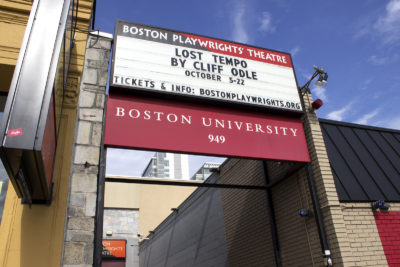
Jazz music is full of melodious, jittery harmonies that often make listeners want to tap their feet to the beat. When paired with words, jazz music can tell its own story, which is exactly what it does in the play “Lost Tempo.”
With a three-piece jazz band to accompany the show, “Lost Tempo” is the first show of Boston Playwrights’ Theatre 2017-18 season.
The 100 straight minute play follows Willie “Cool” Jones (Omar Robinson), a jazz saxophonist, who faces the effects of addiction and racism in 1950’s Harlem. Written by Cliff Odle and directed by Diego Arciniegas, the play discusses the treacherous aspects of the decade that are missing from popular culture.
The play premiered on Oct. 5 and will run through Oct. 22.
The audience becomes a part of Mitzy’s Jazz Kitchen, the nightclub where Willie plays with his quartet every Saturday night. The set has an old-school, underground feel to it, and to someone in the audience, it feels as if you are enjoying the action and music from within the bar.
The actors do not actually play jazz music themselves, instead, a three-piece band plays prior to the show and during scene transitions, giving the feel of a real jazz club. The actors and the musicians seem to become their own ensemble because of the interaction of words and music, allowing one to feed off the other.
The play begins with Willie returning to Mitzy’s Jazz Kitchen after spending time abroad in Paris. The characters hint that Willie likely spent time away to deal with a drug addiction that was affecting his ability to perform. His former lover, Barbara “Babs” Rosenbaum (Evelyn Howe), runs the jazz club and welcomes him back as a performer, telling him that all he has to do is play.
Willie’s quartet is formed by an old friend and trumpeter named Lane Blake (Kinson Theodoris), a bass player named Langford “Mack” McDaniels (Mishell Lilly), and an optimistic, newbie drummer named John “Sporty” Dale (Arthur Gomez). Although they have serious moments, the actors in the quartet give the audience much needed comic relief with witty remarks and sly jokes.
The play aims to explore themes of the 1950s that are consistently ignored by modern culture. The nostalgia of the ‘50s often refers to things like milkshakes in a diner and Marilyn Monroe on the big screen, but Odle chooses to abandon these popular images in order to emphasize the dangers of the time period.
All of the characters struggle with issues of racial identity during the rise of the civil rights movement. There is an acute sense of awareness for the musicians that they are simply there to make money for the owners.
When Willie attempts to buy part ownership of the club, Babs reminds him that the other owners do not want him to have any power, despite his immense talent.
In addition to the theme of race, the play focuses largely on the effects of drug addiction — both the addict and his family and friends. The play touches delicately — yet powerfully — on the subject, following the decline of Willie’s music and relationships as he continues to use drugs.
The play also explores the idea of feminism and independence from men. Both Babs and Sheila “She’She” Jones (Miranda Adekoje) represent strong figures who stand up for themselves and each other. Even though they are the only two female characters in the play, the women occupy a large part of the plot and exist outside of Willie’s story.
In spite of the dark themes, the play is full of upbeat jazz music paired with comedic one-liners. The audience will find room here both for boisterous laughter and quiet introspection that allows them to come away with a new perspective about a well-known decade.
















































































































